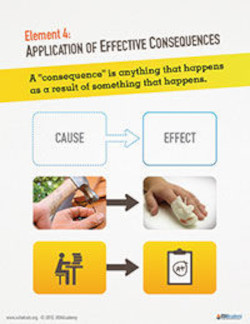Element 4: Application of Effective Consequences
What is a Consequence?
A "consequence" refers to the outcome or result that follows an action or event.
A consequence can also be understood as the effect resulting from a specific cause. In each example below, the initial behavior or action is the cause: the reaction is the consequence or effect.
Below are examples demonstrating the cause-and-effect relationship in various scenarios. In each example below, the initial behavior or action is the cause: the reaction is the effect or consequence.
- Hitting Your Thumb with a Hammer: The action of striking your thumb (cause) naturally leads to pain, injury, and possibly embarrassment (effects).
- Disregarding Safety: Believing that safety isn't important and taking unsafe shortcuts (cause) often results in personal injury (effect).
- Supervisor's Yelling: Being yelled at by a supervisor (cause) can provoke a range of responses, such as yelling back, apologizing, leaving, or even quitting the job (effects).
Is There Any Escape from Consequences?
Not in the workplace. It's crucial to understand that every action has a consequence; there's no scenario where an action results in 'no consequence.' You cannot escape a consequence. For example, a supervisor expressing gratitude to a worker for a safety suggestion represents a positive consequence. Conversely, if a supervisor neglects to acknowledge a safety suggestion, this act of omission is also a consequence, albeit a negative one.
Effective consequences increase desired behaviors or decrease undesired behaviors. If employee safety performance meets or exceeds the standards set by the employer, some sort of recognition should follow. On the other hand, if the employee makes an informed choice not to comply with the company's safety rules, some sort of appropriate corrective action should follow.
Knowledge Check Choose the best answer for the question.
6-5. In the statement, "If you hit your thumb with a hammer, your thumb will hurt," which part of the statement describes the effect?
You forgot to answer the question!

